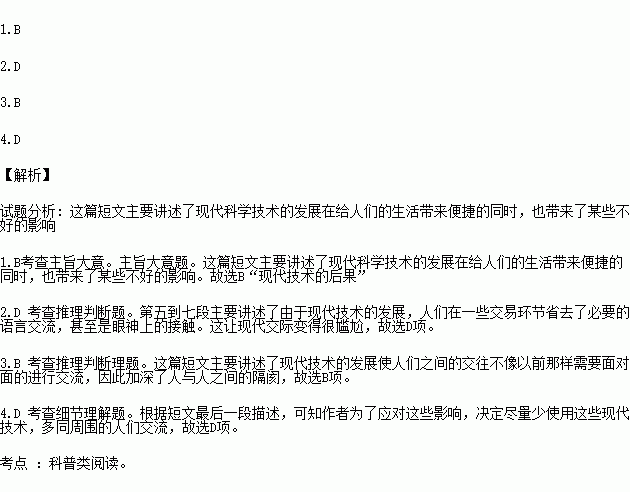题目内容
With the development of science and technology, new inventions, especially new electronic products, have made people’s lives easy and convenient. But as the saying puts: A coin has two sides.
One day, I was walking in the park with a friend and his cell phone rang, interrupting our conversation. There we were, walking and talking on a beautiful sunny day and…I became invisible, absent from the conversation.
The telephone used to connect you to the absent. Now it makes people sitting next to you feel absent. Why is it that the more connected we get, the more disconnected I feel? Every advance in communications technology is a tragedy to the closeness of human interaction. With email and instant messaging over the Internet, we can now communicate without seeing or talking to one another. With voice mail, you can conduct entire conversations without ever reaching anyone. If my mom has a question, I just leave the answer on her machine.
As almost every contact we can imagine between human beings gets automated, the alienation(疏远) index goes up. You can't even call a person to get the phone number of another person any more. Directory assistance is almost always fully automated.
Pumping petrol at the station? Why say good morning to the attendant when you can swipe(刷)your credit card at the pump and save yourself the bother of human contact?
Making a deposit at the bank? Why talk to a teller who might live in the neighborhood when you can just insert your card into ATM?
Pretty soon you won’t have the burden of making eye contact at the grocery shop. Some supermarket chains are using a self-scanner so you can check yourself out, avoiding those check-out people who look at you and ask how you are doing.
I am not against modern technology. I own a cell phone, an ATM card, a voice mail system, and an email account. Giving them up isn't wise…they're a great help to us. It's some of their possible consequences that make me feel uneasy.
More and more, I find myself hiding behind e-mail to do a job meant for conversation. Or being relieved that voice mail picked up a call because I didn't really have time to talk. The communications industry devoted to helping me keep in touch is making me lonelier.
So I've put myself on technology restriction: no instant messaging, with people who live near me,no cell phoning in the presence of friends, no letting the voice mail pick up when I'm at home.
1.Which of the following would be the best title of the passage?
A. The Advance of Communications Technology
B. The Consequences of Modern Technology
C. The Process of Communications Revolution
D. The Automation of Modern Communications
2. Paragraphs 5 to 7 are listed as examples, which show that the use of modern communications is ___________.
A. encouraging B. disappointing
C. satisfying D. embarrassing
3.The passage implies that _______________.
A. modern technology is bridging the people
B. modern technology is separating the people
C. modern technology is developing too rapidly
D. modern technology is interrupting our lives
4. What does the writer think to do with the modern technology?
A. We may use them no matter what others are doing.
B. We can throw them away and return to the ancient.
C. We can be far away from them forever.
D. We can use them less and communicate with the people around us.


 ),并在其下面写出该加的词。
),并在其下面写出该加的词。